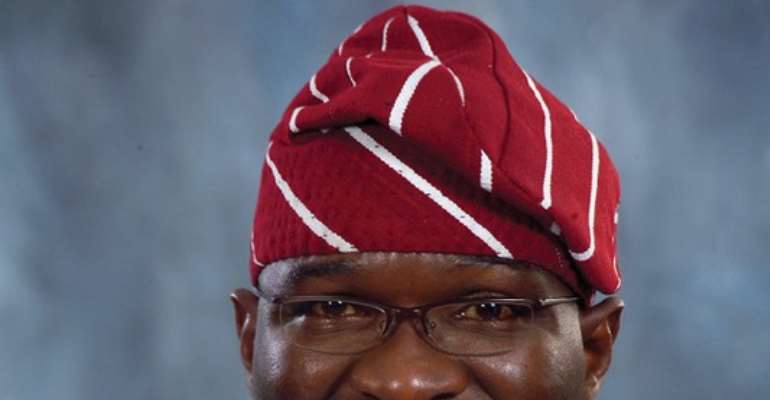Fashola Proposes N445.18bn Budget Estimate For 2011

LAGOS, Dec 14, (THEWILL) - Amidst an atmosphere of conviviality, Governor Babatunde Raji Fashola (SAN) today presented an estimated budget of N445.18 billion to the state House of Assembly for the 2011 fiscal year.
When compared with the revised budget of the 2010 fiscal year, the governor, who was well received at the Assembly, said the budget proposal was 8.2 percent higher than that of previous year.
However, Speaker Adeyemi Ikuforiji said the Assembly under his leadership would keep asking and insist on accountability of past appropriations and lay good foundation for the current appropriation bill where necessary.
During the presentation of the budget proposal at the chambers of the Assembly, Fashola lamented over the recently published inflation rate of 13 percent, which he said, did not reflect an actual increase in the budget proposal when valued against the figure.
He therefore proposed an estimate of N196.709 billion for recurrent expenditure and N248.471 billion for capital expenditure for the 2011 fiscal year, which he said, would be based on a ration of 56:44 against the revised recurrent expenditure of N178.01 billion and capital expenditure of N233.556 billion for 2010.
He said: "We have received the capital-to-recurrent ratio of 60:40 in 2010 to 56:44 in 2011. The shift towards the recurrent expenditure is largely due to the significant growth in our personnel costs as the state response to the demand of our workers for improved welfare and remuneration conditions."
As indicated in the budget proposal, about estimate of N142.040 billion is allocated for economic affairs, which represents 31 percent of the entire budget; N112.608.016 billion for general public service, which gulps about 25 percent; N39.888 billion for health, which takes about 9 percent; N36.390 billion for environmental protection, which covers about 8.2 percent; N26.761 billion for housing with a share of 6 percent.
Other sectors such as recreation, culture and religion get an estimated proposal of N6.880 billion; which gulps about 1.5 percent; about N61.713 billion for education equivalent of 13.9 percent and estimated N6.137 billion for social protection with a meagre share of 1.4 percent as indicated in the budget presentation.
On capital expenditure, an estimate of N220.016 billion is allocated for core capital; about N14.442 billion for capital development (dedicated); N4.194 billion for grants; N4.619 billion for counterpart funding; N5 billion for special funding; and No.200 billion for risk retention fund proposed for the 2011 fiscal year.
Fashola put the total overhead costs at N128.480 billion, out of which overhead cost stands at N69.809 billion; dedicated at N22.191 billion; subversion at N24.430 billion; staff housing fund at N0.050 billion; debt charge (external) at N1.050 billion; debt charge (internal) at N6.958 billion and debt charge (bond) at N3.992 billion.He said the deficit financing requirement proposed was also put at N73.599 billion, which he said, represents about 1.77 percent of the state’s gross domestic product (GDP).
Bordered by what he described as huge responsibilities before the state government, Fashola advocated a "compensatory share of resources such as value added tax (VAT), port royalty and other revenues derived from the territory of Lagos State."
At the session, Ikuforiji praised Fashola and all members of the State Executive Council for the achievements they had recorded in the past years in transforming the state.
But he said the Assembly “considers budget a very important tool for nation-building, accelerated growth and rapid development, especially in the face of disaffection and discontentment everywhere.”
Ikuforiji added that the Assembly would not shy away from asking questions and also insists on accountability of the past appropriations and lay good foundation for the current appropriation where necessary if the budget must be meaningful in addressing poverty, unemployment and want in most parts of the state.
He therefore tasked the state government “to be more responsive and sensitive to the interest and feelings of inhabitants of the state.
